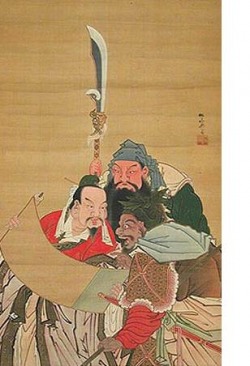The slang I want to discuss today is "Double Whammy", which has the exact meaning of 賠了夫人又折兵. I have put the below post up at my Wordpress blog intended for foreigners. My friends if I got the background of the Chinese proverb wrong, please let me know.
This proverb was originated from the Romance of the Three Kingdoms 三国演义 written by Luo Guanzhong 罗贯中 in the 14th century, which is a Chinese historical novel based upon events in the turbulent years near the end of the Han Dynasty and the Three Kingdoms era of China, starting in 169 and ending with the reunification of the land in 280.
It is acclaimed as one of the Four Great Classical Novels of Chinese literature, with a grand total of 800,000 words, nearly a thousand characters, most of them historical, in 120 chapters.
Background
The background of this proverb is rather complicated which involves one chapter of the novel. In a nutshell, the person at the centre stage was Liu Bei 刘备, a governor of one of the provinces of China at the late Eastern Han Dynasty. On the other side was Sun Quan 孙权, who had an uneasy alliance with Liu. Sun enticed Liu to marry his sister intending to kill Liu at his territory. However, that did not work. Liu married Sun’s sister and decided to flee without letting Sun know. Sun sent an army to chase the couples, who were saved by boats waiting for them at the shore. Just as the boats were sailing away, the general of the army overhead from the boat these words “賠了夫人又折兵” which literally means losing the wife (although it was Sun’s sister) and the army returned empty handed. However, it is commonly accepted as meaning “losing your wife and the army”
Meaning
A double whammy. Making double losses in a deal or losing on both sides of it.
Examples
This proverb was originated from the Romance of the Three Kingdoms 三国演义 written by Luo Guanzhong 罗贯中 in the 14th century, which is a Chinese historical novel based upon events in the turbulent years near the end of the Han Dynasty and the Three Kingdoms era of China, starting in 169 and ending with the reunification of the land in 280.
It is acclaimed as one of the Four Great Classical Novels of Chinese literature, with a grand total of 800,000 words, nearly a thousand characters, most of them historical, in 120 chapters.
Background
The background of this proverb is rather complicated which involves one chapter of the novel. In a nutshell, the person at the centre stage was Liu Bei 刘备, a governor of one of the provinces of China at the late Eastern Han Dynasty. On the other side was Sun Quan 孙权, who had an uneasy alliance with Liu. Sun enticed Liu to marry his sister intending to kill Liu at his territory. However, that did not work. Liu married Sun’s sister and decided to flee without letting Sun know. Sun sent an army to chase the couples, who were saved by boats waiting for them at the shore. Just as the boats were sailing away, the general of the army overhead from the boat these words “賠了夫人又折兵” which literally means losing the wife (although it was Sun’s sister) and the army returned empty handed. However, it is commonly accepted as meaning “losing your wife and the army”
Meaning
A double whammy. Making double losses in a deal or losing on both sides of it.
Examples
- The alleged extra-marital affair of world's number one golfer, Tiger Woods, is likely to cause him to lose his wife and on top of that millions of dollars of commercial endorsements.
- A woman gave her first love to a man and loaned him money and got dumped by him, or vice versa


 RSS Feed
RSS Feed